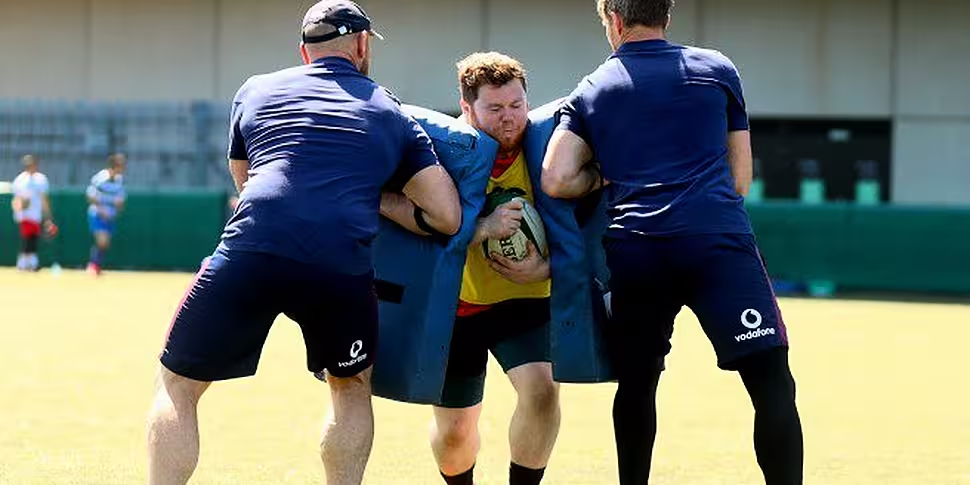One of Ireland’s greatest successes on the rugby pitch came on November 5th 2016, after 111 years of trying – Joe Schmidt’s men finally beat the New Zealand All Blacks.
The foundations for the famous victory were laid almost 6,000KM away from Soldier Field in Chicago, Carton House in Maynooth is where the hard yards were ran.
The training pitch on the grounds of the Maynooth estate is where hours of unseen work happens, this week 98FM Sport got a rare glimpse into the work done behind closed doors.
Canterbury gave us the chance to train like an Ireland player; the session took place at Lansdowne Rugby club in the shadow of the Aviva Stadium.
The afternoon began with a team talk from the coaches Simon Easterby, Greg Feek and Jason Cowman, the trio outlined the plans for the day and the various skills that would be worked on in the sessions.
They were assisted by Ulster and Ireland winger Andrew Trimble and Connacht and Ireland duo Finlay Bealham and Niyi Adeolokun.

Fitness coach Jason Cowman started with a dynamic warm-up which included many of the drills that the Ireland players would begin their session during training camps in Maynooth.
The emphasis was on short, sharp exercises packed with intensity as Cowman explains that physical conditioning has evolved beyond just arduous running of lap after lap:
“I’m doing it a long time and it is almost unrecognisable but there are some qualities that stay the same, everything changes yet can still stay the same.
“There’s huge amount of science behind it, there’s a lot more information we can gather on players. Some of the more traditional elements of looking after each other, working hard for each other, competing as we said, will always be there. Those traditional things will stay with us.
“Part of what I like to bring to the programme and a session is a bit of energy, but also challenges, making sure there’s intensity to what we do.
"Making sure it is relevant to the demand the players are going to be facing on game day from a physical perspective. If I can help the coaches implement a plan that meets those needs, my job is more or less done”

The ball was introduced after the warm up, forwards coach Simon Easterby introduced a passing drill.
After a couple of error ridden false starts, the group of 12 men and women got their heads around it, like all of the session there was a competitive edge.
Two groups of 6 racing against each other – team work and communication were essential for this part of the session – speed, handling and execution also played a crucial part.
The coaches set the highest standard at international level and the group mostly comprised of beginners, was not exempt from those rigours.
Easterby was pleased with the progress made says the most fulfilling part of coaching is seeing players improve – no matter what level they’re playing at:
Some big hits going in as @canterburyNZ show competition winners what it's like to train like an Ireland player! 💪ðŸ‰ðŸŽ¥ #CommittedToTheGame pic.twitter.com/U6WZq0l2hl
— Teneo PSG Sports (@TeneoPSGSports) May 10, 2017
“I think that’s the whole nature of the sport, it’s very fine margins these days between winning and losing, I think it’s so important that we have a competitive edge (in training).
“That puts pressure on the skills, but when they do them under pressure you can achieve better scores I think even in a simple drill, it showed when the pressure is on, guys can come up with the goods.
“They can go and deliver a really effective performance and cut back on times, those things are vital. We saw some of the elements of the skill drills we were doing when we did some counter attack and a bit of defensive stuff, it was coming out with that - the quick hands and ability to shift the ball.
“We’re trying to translate what we do in the drills; you want to see that in the game, we saw that out there (on the pitch) when we made it unstructured, there was still plenty of good skill and guys were able to put each other into space, which maybe they might have done had they not done those drills.”

Easterby says training methods have evolved to keep the core skills sharp without going through the attrition of replicating a game twice a week on the training pitch:
“There’s a bit more pressure on the players to prepare themselves and make sure they’re in the right place mentally and physically, it creates a training session without necessarily doing a lot of the physical contact.
“You’re still covering those metres, your high intensity metres which Jason (Cowman, the fitness coach of the Irish Rugby team) is always looking for, you’re trying to replicate as much of the game during training as possible without bashing each other. The players have plenty of that on match day.
“We try and take our players away from that physical contact a little bit, but they know that they’re preparing mentally to do that on a weekend.
“The little drills we did today will have the key elements of delivering those things on the weekend when it comes to the physicality and that edge the players need.
“What we’re trying to do is reduce that during the week so they can still get that intensity up without having to be bashed around again.”

Challenging the group is what the coaches aim to do at all levels – the array of skills and drills required in a session only puts players through their paces physically but mentally as well.
Concentration is essential particularly when fatigue starts to set in – that’s the point the session reached another level of intensity.
Scrum coach Greg Feek explains why: “We probably tailored it that way to gear everyone up to give them some tools to execute with intensity.
“If you’re trying to pass the ball and catch with intensity and you haven’t got it, you’re not achieving anything.
“We get to that point and then really challenge them and up the ante, our sessions are probably a bit shorter but everything is really intense the whole time.
“We try to execute under pressure but also under fatigue at the end and they were actually getting better.
“When you train under pressure, then when there is pressure (in match-day), it (the training) can actually come through for you.”
Canterbury, the world's leading rugby apparel brand and kit supplier to the Ireland Rugby team 98FM Sport the opportunity to train like an Ireland player and find out what life is like as an international rugby star.
If you’re committed to training, nutrition and recovery, visit canterbury.com/training-hub for expert advice.










